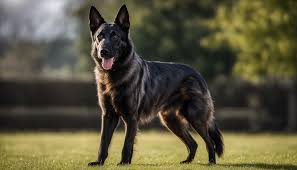
Dutch Shepherd
Conditions of detention
Dutch Shepherds are highly adaptable but thrive best in homes where they have plenty of space to exercise. They are well-suited for both rural and suburban environments and can adapt to apartment living if given enough daily physical and mental stimulation.
Useful Fact: Dutch Shepherds excel in active households and do well when involved in activities like agility training, obedience competitions, and other dog sports.
Nutrition and diet
A balanced diet is essential for the Dutch Shepherd’s overall health and vitality. High-quality dog food that meets their nutritional requirements, based on their age, size, and activity level, is recommended. Fresh water should always be available.
Useful Fact: Dutch Shepherds are active dogs with high energy levels, so their diet should include a good mix of proteins, fats, and carbohydrates to sustain their energy.
Health
Dutch Shepherds are generally healthy dogs, but they can be prone to certain genetic conditions such as hip dysplasia, elbow dysplasia, and progressive retinal atrophy. Regular veterinary check-ups are crucial for early detection and management of potential health issues.
Useful Fact: Maintaining a healthy weight and providing regular exercise can help prevent joint issues.
Grooming and care
Dutch Shepherds have three coat varieties: short-haired, long-haired, and rough-haired. Regardless of coat type, regular grooming is essential. Short-haired dogs need weekly brushing, while long-haired and rough-haired varieties require more frequent grooming to prevent matting and tangling.
Useful Fact: Dutch Shepherds shed year-round, with heavier shedding during seasonal changes, so regular brushing helps manage loose hair.
Education and training
Dutch Shepherds are intelligent, eager to learn, and highly trainable. They respond well to positive reinforcement techniques, such as treats, praise, and play. Early training and socialization are essential to ensure they grow into well-behaved adults.
Useful Fact: Dutch Shepherds excel in obedience, agility, and protection work due to their high intelligence and strong work ethic.
Toys and entertainment
Dutch Shepherds need plenty of mental and physical stimulation. Providing a variety of toys, such as chew toys, puzzle toys, and interactive games, can help prevent boredom.
Useful Fact: Engaging them in activities that challenge their minds and bodies, like scent tracking or agility courses, can be particularly satisfying for this breed.
Safety
Due to their high energy levels and intelligence, it’s crucial to keep Dutch Shepherds in a secure, fenced area when outside. They should always be on a leash when not in a confined space to prevent them from wandering off or getting into trouble.
Useful Fact: Microchipping your Dutch Shepherd can help ensure they are returned to you if they ever get lost.
Accessories
Dutch Shepherds benefit from durable accessories, including collars, leashes, and harnesses. Given their active nature, investing in high-quality gear is important for their safety and comfort.
Useful Fact: A sturdy, comfortable bed is essential for their rest and recovery after a day of activity.
Socialization
Early and consistent socialization is key to developing a well-rounded Dutch Shepherd. Expose them to different people, environments, and other animals to ensure they grow up to be confident and well-mannered.
Useful Fact: Puppy classes can be an excellent way to start socialization and training in a controlled environment.
Travel and Transportation
Dutch Shepherds are generally good travelers if they are introduced to it gradually and positively. They should be secured in a travel crate or with a dog seat belt harness when in a vehicle to ensure their safety.
Useful Fact: Frequent breaks during long trips are important to allow them to stretch, hydrate, and relieve themselves.
Behavior and psychology
Dutch Shepherds are known for their loyalty, intelligence, and protective nature. They form strong bonds with their families and are excellent with children. They are naturally protective, making them good watchdogs.
Useful Fact: Consistent routines and positive reinforcement help foster a sense of security and well-being in Dutch Shepherds.
Legal aspects
In some areas, owning a Dutch Shepherd may require registration with local authorities or kennel clubs. It’s important to be aware of and comply with any breed-specific legislation in your area.
Useful Fact: Keeping your dog’s vaccinations and licenses up to date is crucial for legal compliance and their health.


